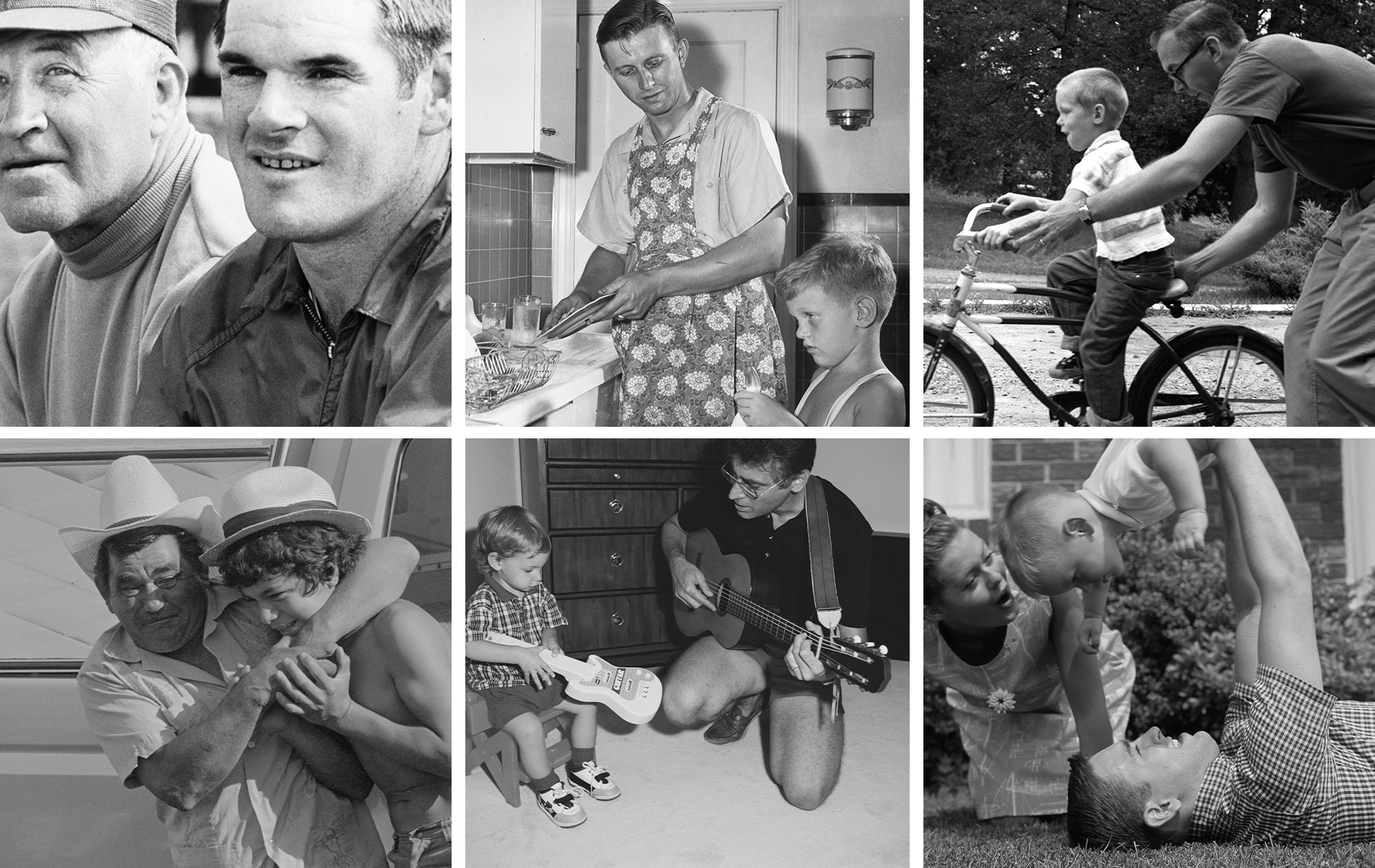There’s a rhythm to the beginning and ending of a Little League game. About an hour before game time, players start trickling into the park for warm-ups. There are kids playing catch in the outfield, others taking turns for batting practice in the cages. Moms and grandparents are unfolding chairs or grabbing spots on the bleachers. The players’ siblings are starting to identify each other as their playmates for the next couple hours. The few players still goofing off in the home team dugout will have to move out of the way as a crew of dads begins the pregame ritual of prepping the field.
It’s time for some dadwork.
Without anyone giving orders, the dads pull off the tarps over the pitcher’s mound and home plate. Dads rake the infield dirt. Dads remove the first and third bases, roll out the string, and stake it down to measure out the foul lines. One dad grabs the chalker to carefully outline the batter’s boxes and both foul lines. Depending on how the sun and rain have faded work from earlier in the season, a dad might grab the spray paint to reapply the foul lines from the edge of the infield to the outfield fence.
And when the game is all over, the visiting team dads take over. As players pack up their equipment and slurp their Gatorade, dads move with purpose to grab the drag mats and rakes to clean up for the next game. If it’s the end of the day or a storm is moving in, dads also pull the tarps back over the dirt.
Not once have my sons ever said, “Great job chalking the batter’s box, Dad.” I don’t expect them to sing my praises for a well-dragged infield. If a Little Leaguer has thanked their dad for getting up early the morning after a rainstorm, before work, to shovel extra dirt onto the field to make it playable for later that night, I’ve never heard about it.
But that’s more than okay. We’re not in it for the glory or the money, because there’s none of either to be had. This is just what dads do. We operate in the background, keeping things on track, in order, on time, running (mostly) smoothly. Dadwork is thankless, messy, and has to get done.
We assume the position behind the steering wheel for every 10-hour family road trip while mom and the kiddos enjoy snacks and naps and stress-free transportation. We mow the lawn every Saturday morning so our kids can play on it in the afternoon. We set up the tent and build the campfire, change the flat tire, tie the Christmas tree to the top of the car, run out at night to buy the last-minute school project supplies, and reach into the kitchen sink to pull out whatever is blocking the disposal.
Plenty of dadwork is dangerous (or has the appearance of danger). It often takes place outside, or in the basement or attic, and frequently requires the use of power tools or sharp implements. Moms will sometimes encourage the older children to go help their dad get the dadwork done—hold the flashlight, go find the screwdriver (“That’s a flathead, I need a Phillips!”), bag the grass. Truth be told, this usually makes the dadwork more difficult and longer to complete, but we’re happy to accept the help.
These aren’t the nurturing tasks that kids intuitively turn to moms for. I’ve put Band-Aids on countless scrapes, but it’s always mom they call out for when they run inside with a skinned knee. The same cry goes up when it comes to questions involving dessert, clean laundry, a sibling dispute, or watching TV. The work of a mom often brings her into direct and personal contact with the immediate needs of her offspring.
We dads can and do a lot of what moms do, but our kids seem to have figured out, through instinct or experience, that on some of the more delicate, particular, and specific tasks, we’re just not up to snuff. “I want mom to do it,” they like to say. In the dramatic production of childrearing, moms are the stars of the show, and dads are the stagehands.
(In case it wasn’t clear, I want to underscore here the crucial role moms play. Our house does not function without the hard work, planning, time, dedication, and sacrifice that my wife makes. But come on. Mother’s Day was last month. This is our time.)
This is all simplistic and, some might say, retrograde. Indeed, fatherhood is, slowly but surely, changing with the times. An analysis of data from the Bureau of Labor Statistics by researchers at the University of Kansas found that millennial fathers provided more childcare in 2023 than the same cohort did in 2015, including more than 15 additional minutes of care during the weekdays and more than 30 minutes more on weekends. When the kids are babies, we millennial dads are changing more diapers and doing more night feedings than our own dads did. We’re stepping up to braid their hair, take them to the doctor, and otherwise take a more active and direct role in the parts of rearing children that have traditionally fallen to moms.
All of this paternal involvement is fine and good, and there’s nothing I enjoy more than sweet, sweet quality time with my kids while they still want to spend it with me. But increasingly, I think it’s all that background dadwork that matters more—precisely because it’s not in the background. Not for our kids, at least. They’re watching, listening, learning.
When we’re diligently making things happen, we dads are modeling the exact kind of behavior we want our kids to exhibit when they grow up to be adults. When there’s an unenviable task to be completed, a dad jumps at the chance to do it, and his kids observe the value of stepping up. When things look dicey—in the dark, or in the snow, or while carrying something incredibly heavy—a dad soldiers forward with his head high, and his kids see that adversity can be overcome when duty calls. When the dad does his dadwork as a matter of routine, without complaint, his kids are learning self-discipline, too.
Of course, fatherhood involves a lot more than this kind of dadwork. It occasionally requires having important conversations with the kids, which we often stumble through, unsure where to start or where to finish. Fatherhood obligates you to discipline the little tykes so they don’t grow up to be heathens and criminals, and you’re often left concerned that you were either too hard or too soft on them. And it’s an unfortunate fact that dads generally have to spend too much time away from the family, working at a paying job to earn money to afford the repairs for the garbage disposal, the Little League registration fees, the new tennis shoes to replace the old ones the kids just outgrew.
At its core, it’s all dadwork. And our kids, whether they realize it now or not, are counting on us to get it done.









Please note that we at The Dispatch hold ourselves, our work, and our commenters to a higher standard than other places on the internet. We welcome comments that foster genuine debate or discussion—including comments critical of us or our work—but responses that include ad hominem attacks on fellow Dispatch members or are intended to stoke fear and anger may be moderated.
With your membership, you only have the ability to comment on The Morning Dispatch articles. Consider upgrading to join the conversation everywhere.